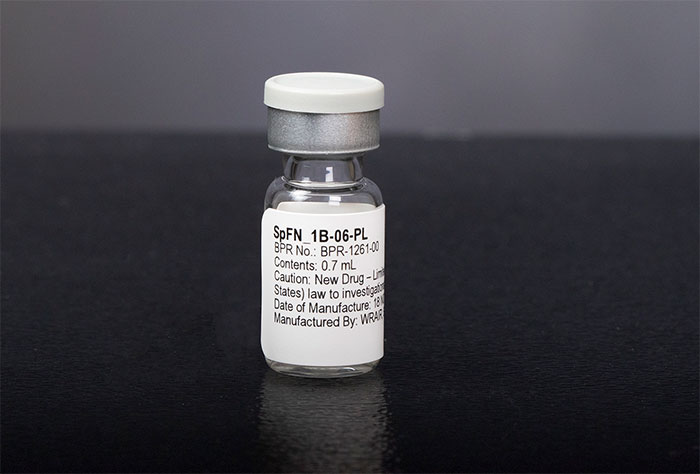News Release
Media Contact:
Lee Osberry
Public Affairs Specialist
Walter Reed Army Institute of Research
lee.a.osberry.civ@mail.mil
Press Release — For Immediate Release
Series of Preclinical Studies Supports the Army's Pan-Coronavirus Vaccine Development Strategy

SILVER SPRING, Md. – A series of recently published preclinical study results show that the Spike Ferritin Nanoparticle (SpFN) COVID-19 vaccine developed by researchers at the Walter Reed Army Institute of Research (WRAIR) not only elicits a potent immune response but may also provide broad protection against SARS-CoV-2 variants of concern as well as other coronaviruses.
Scientists in WRAIR's Emerging Infectious Diseases Branch (EIDB) developed the SpFN nanoparticle vaccine, based on a ferritin platform, as part of a forward-thinking "pan-SARS" strategy that aims to address the current pandemic and acts as a first line of defense against variants of concern and similar viruses that could emerge in the future.
"The accelerating emergence of human coronaviruses throughout the past two decades and the rise of SARS-CoV-2 variants, including most recently Omicron, underscore the continued need for next-generation preemptive vaccines that confer broad protection against coronavirus diseases," said Dr. Kayvon Modjarrad, Director of the Emerging Infectious Diseases Branch at WRAIR, co-inventor of the vaccine and the U.S. Army lead for SpFN. "Our strategy has been to develop a 'pan-coronavirus' vaccine technology that could potentially offer safe, effective and durable protection against multiple coronavirus strains and species."
Pre-clinical studies published today in Science Translational Medicine indicate that the SpFN vaccine protects non-human primates from disease caused by the original strain of SARS-CoV-2 and induces highly-potent and broadly-neutralizing antibody responses against major SARS-CoV-2 variants of concern including the SARS-CoV-1 virus that emerged in 2002.
SpFN entered Phase 1 human trials in April 2021. Early analyses, expected to conclude this month, will provide insights into whether SpFN's potency and breadth, as demonstrated in preclinical trials, will carry over into humans. The data will also allow researchers to compare SpFN's immune profile to that of other COVID-19 vaccines already authorized for emergency use.
"This vaccine stands out in the COVID-19 vaccine landscape," Modjarrad said. "The repetitive and ordered display of the coronavirus spike protein on a multi-faced nanoparticle may stimulate immunity in such a way as to translate into significantly broader protection." WRAIR developed a secondary candidate vaccine, a SARS-CoV-2 Spike Receptor-Binding Domain Ferritin Nanoparticle (RFN) vaccine, which targets a smaller part of the coronavirus Spike protein than the SpFN vaccine. Results from a study, published recently in the Proceedings of the National Academy of Sciences, show that this vaccine potentially offers similar protection against an array of SARS-CoV-2 variants and SARS-CoV-1.
"The RFN vaccine candidate is more compact and has some natural advantages as we try to increase the immune response against multiple coronaviruses using a single vaccine platform, so it is still under consideration as part of our pan-coronavirus vaccine development pipeline," said WRAIR structural biologist and vaccine co-inventor, Dr. Gordon Joyce.
"The threat from COVID-19 continues as it evolves, and eventually there will be other emerging disease threats," said Dr. Nelson Michael, Director of the Center for Infectious Diseases Research at WRAIR. "Our investment in developing a next generation vaccine is an important step towards getting ahead of COVID-19 and future disease threats."
About the Army-developed SpFN vaccine
The SpFN vaccine is a protein subunit nanoparticle vaccine platform, meaning it presents a fragment of a virus to the immune system to elicit a protective response. SpFN comprises multiple coronavirus Spike proteins linked to the surface of a multifaceted ferritin nanoparticle. Researchers hypothesize that presenting multiple copies of Spike in an ordered fashion may be the key to inducing a potent and broad immune response. The platform also has advantages as a potentially global vaccine because it remains stable at a wide range of temperatures. This would be especially useful in settings where ultra-cold freezers are scarce.
The SpFN vaccine is formulated with an adjuvant called ALFQ, one of the Army Liposome Formulation family of adjuvants developed by Army researchers at WRAIR. An adjuvant is a component of a vaccine that helps activate the immune system and improve immune responses. Preclinical and early clinical studies have demonstrated ALFQ to be safe and strongly potent as a vaccine adjuvant.
-END-
About WRAIR:
The Walter Reed Army Institute of Research (WRAIR), part of the U.S. Army Medical Research and Development Command, provides unique research capabilities and innovative medical solutions to a range of Force Health Protection and Readiness challenges currently facing U.S. Service Members, along with threats anticipated during future operations. WRAIR has created a model of vaccine and therapeutic development that is unique, nimble, and responsive to dynamically evolving infectious disease threats of military importance. Leveraging WRAIR's expertise, facilities, and international network, the Institute has helped developed many of the vaccines and drugs in use today by military and civilian medicine, around the globe. In 2018, the Emerging Infectious Diseases Branch was created with an explicit mission to survey, anticipate and counter the growing threat of emerging infectious diseases of key importance to U.S. forces in the homeland and abroad.
- A SARS-CoV-2 Ferritin Nanoparticle Vaccine Elicits Protective Immune Responses in Nonhuman Primates
- Efficacy and breadth of adjuvanted SARS-CoV-2 receptor-binding domain nanoparticle vaccine in macaques
- SARS-CoV-2 ferritin nanoparticle vaccine induces robust innate immune activity driving polyfunctional spike-specific T cell responses
- A SARS-CoV-2 spike ferritin nanoparticle vaccine protects against heterologous challenge with B.1.1.7 and B.1.351 virus variants in Syrian golden hamsters
- SARS-CoV-2 ferritin nanoparticle vaccines elicit broad SARS coronavirus immunogenicity
- SARS-COV-2-Spike-Ferritin-Nanoparticle (SpFN) Vaccine With ALFQ Adjuvant for Prevention of COVID-19 in Healthy Adults Clinical Trials.gov
 An official website of the United States government
An official website of the United States government
 ) or https:// means you've safely connected to the .mil website. Share sensitive information only on official, secure websites.
) or https:// means you've safely connected to the .mil website. Share sensitive information only on official, secure websites.


